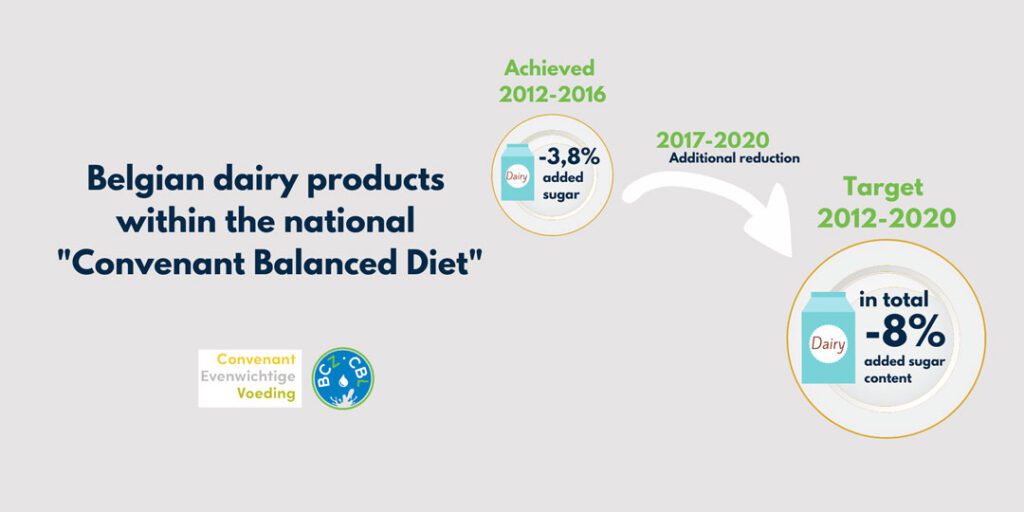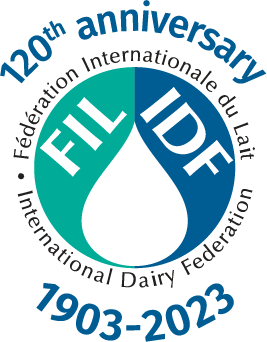Share this page
8% less added sugar in Belgian dairy products
Not only is the amount of added sugar in existing products strongly reduced, new innovations with far less or no added sugar at all were launched on the Belgian market.


Alignment with SDGs
AUTHOR
Jolien Willems and Lien Callewaert BCZ-CBL (Belgian Dairy Association) • Belgium
Abstract
Numbers of overweight and obese people are rising worldwide. Causes of overweight and obesity are complex and need a multidisciplinary approach. In Belgium, the dairy industry engaged, as part of the food industry, to take its responsibility and part in this debate by providing dairy products with less added sugar to consumers. This was formalised in a collaboration between the food industry, retail, and the government, called “Covenant Balanced Diet”.
The dairy industry committed to reduce the added sugars in dairy products by 8% in 2020 (in comparison to 2012).
Moving the wheel
In collaboration with the dairy companies, a reduction target was set: 8% less added sugar in dairy products by 2020. Retail and dairy companies together worked hard to reach this goal. To allow consumers to get used to a less sweet taste, reformulation must be accomplished stepwise. For some products, we noticed that the achieved added sugar reduction was not acceptable for consumers. In such cases, dairy companies were forced to take a step back, and adjust their reduction scheme.
Every year, all products within this commitment are monitored to see their evolution and to estimate the overall added sugar reduction in dairy products, based on their market shares. These results were discussed in detail to stimulate progress.
Dairy products offered to the consumer differ on fat content as well as amounts of added sugars.
Lien Callewaert Tweet
History of success
Our first milestone, 3% reduction in added sugar was met in 2016. Part 2 of our engagement is coming to its end with a reduction of another 5% to achieve a total reduction of 8 % in 2020. By monitoring the amount of added sugars in all dairy products within the commitment yearly, we were able to evaluate and discuss our progress and difficulties each year. Due to our long-term commitment, companies had a clear vision for new products. That is why this period saw a lot of new products brought on the market that were very low in added sugars or even had no added sugar at all.
The wide variety of dairy products in our stores give the consumer the opportunity to choose between old and nostalgic recipes or more innovative products. Not only are there dairy products with differing fat content, but also dairy products with differing amounts of added sugars. As such, the dairy sector provides the consumer a wide selection of dairy products fit for every occasion and every individual customer, enabling each consumer to make their choices to live a healthier life.


The Belgian Food Based Dietary Guidelines, recommend 250-500 ml dairy products each day
Jolien Williems Tweet
Future Opportunities
Dairy products are nutrient rich, meaning they provide a lot of important nutrients like calcium, vitamins and high-quality protein compared to the amount of energy they contain. Nevertheless, 2020 is not the endpoint for our journey to further improve nutritional quality of dairy products. We will continue to work on existing products, introduce new improved products and launch innovative products. Together with retail and the government within our existing commitment, we will continue to help the Belgian consumer to move towards an even healthier lifestyle with dairy products in all forms and sizes. Our new recommendations, the Belgian Food Based Dietary Guidelines, recommend 250-500 ml dairy products each day, as they are an important part of our diet. And we as the dairy sector fully subscribe this.






